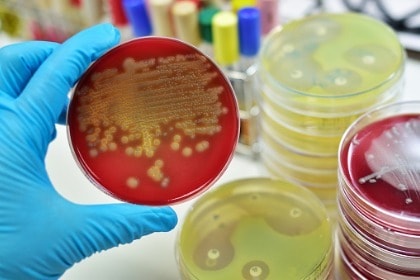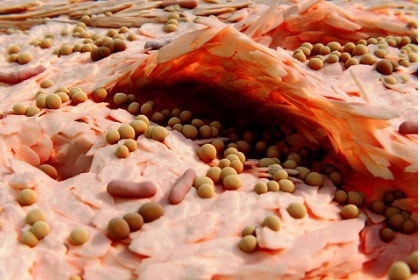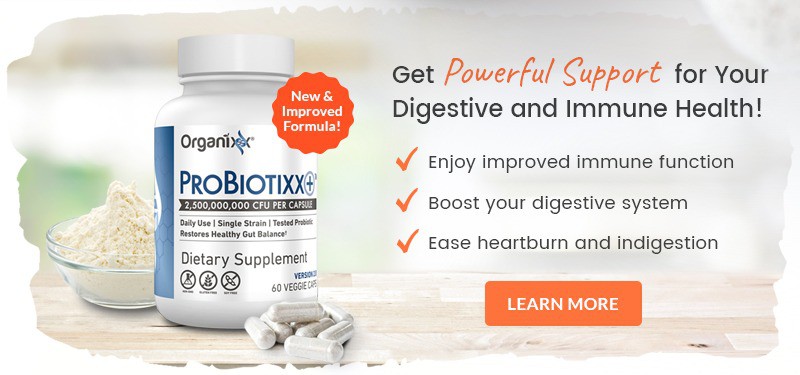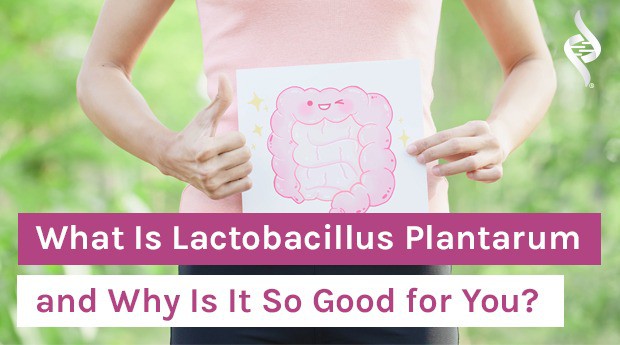What Is Lactobacillus Plantarum and Why Is It So Good for You?
In a hurry? Click here to read the Article Summary...
Research into the role probiotics play in health has exploded over the last decade or so. We now know more about
What Are Probiotics Used For?

Before we dive into the specifics about L. plantarum, let’s discuss why probiotics are essential for your health in the first place. Probiotic means “for life.” In a nutshell, probiotics are “good” bacteria you typically consume via food or supplement form. They support life by protecting you from harmful parasites, viruses, and “bad” bacteria that can cause sickness and disease.
Probiotics and Gut Health
Almost everyone has heard that probiotics are good for digestive health. What you may not know, however, is that probiotics are also essential for:
- healthy metabolism
- heart health [1]
- mental health
- immune system health
- balancing hormones [2]
- managing weight [3]
- keeping allergies at bay
- preventing chronic disease
- supporting your liver
- …and so much more!
Remember that your digestive system is home to up to 80% of all your immune cells. The result? You simply cannot survive and feel good without the right amount and the right kind of probiotics. And perhaps the most important type of beneficial bacteria for your overall health is Lactobacillus plantarum.
What Makes Lactobacillus Plantarum Probiotic So Special?

A decade ago we heard very little about the gut microbiome and “good” and “bad” bacteria, but all that has changed.
As mentioned earlier, Lactobacillus plantarum, or L. plantarum, has recently been the focus of much research and is a rising “superstar” amongst probiotics. What’s interesting is that it’s a very common kind of beneficial bacteria found in cultured vegetables.
L.
This barrier prevents pathogenic bacteria such as E. coli from penetrating the lining of your gastrointestinal tract and entering your bloodstream.
L. Plantarum Withstands Antibiotics Better Than L. Casei
The Lactobacillus

One Chinese investigation [4] conducted in 2015 compared the survival rate of Lactobacillus
The researchers discovered that L.
Experts agree that if you need to take antibiotics, an adequate amount of L.
Landmark 2017 Study: L. Plantarum Saves Newborn Lives
People of all ages need a healthy amount of L. plantarum in their digestive tract for overall good health. This is especially true for the very young

Sepsis is a dangerous and life-threatening blood infection that causes major injury to tissues and organs, often resulting in death. According to a World Health Organization (WHO) report (gathering data from the Indian National Neonatal Perinatal Database), sepsis is the most common cause of neonatal death in that country [8].
It is also responsible for 30% to 50% of newborn deaths in all developing countries. While the numbers are smaller, sepsis is a leading cause of neonatal death in the United States as well [9].
A recent study sponsored by the U.S. National Institutes of Health (NIH) in conjunction with the University of Nebraska Medical Center and institutions in India had a very promising outcome. Over 4,000 pregnant women participated in the study that found an L. plantarum probiotic regimen lowered the incidence of sepsis in newborns by up to 40% [10].
Other Positive Benefits for Newborns
The researchers also found that the L. plantarum probiotic regime had other positive side effects for the newborns. In addition to reducing rates of sepsis, these babies also had an 82% lower rate of Gram-positive bacterial infections and a 75% reduction in Gram-negative bacteria. This, in turn, led to healthier babies overall, with 34% fewer cases of pneumonia and other respiratory infections.
The researchers stated in a press release for the NIH that the introduction of the probiotic “may have boosted immunity throughout the entire body, not just in the digestive system [11].”

Amongst the common opportunistic Gram-positive bacterium that can create disease states in humans are:
- Streptococcus
- Staphylococcus
- Corynebacterium
- Listeria
- Bacillus
- Clostridium
Gram-negative bacterial infections are difficult to remedy as they tend to be hardier and more resistant to antibiotics [12].
The NIH study is an amazing testament to the power of one simple probiotic and its ability to literally save lives. Because of this, pregnant mothers may be well advised to discuss with their doctors how to ensure sufficient quantities of L. plantarum during pregnancy.
Lactobacillus Plantarum & Digestive Disorders
In addition to its benefits for babies, L. plantarum can be extremely beneficial for those with digestive disorders such as irritable bowel syndrome (IBS), Crohn’s disease, and colitis.

In a Polish clinical trial [13], all participants who were given Lactobacillus plantarum in liquid form experienced less abdominal pain and regulation in stool consistency.
The researchers also alluded to the possibility that L. plantarum may someday become part of regular treatment for IBS.
How L. Plantarum Crowds Out Golden Staph and Other Bad Bacteria
One of the reasons why L. plantarum probiotic is so effective against some of the most aggressive opportunistic bacterium as well as the most common digestive complaints has to do with its unique genetic makeup. We stated earlier that one of the unique characteristics of L. plantarum is its ability to “adhere” to the intestinal wall.
The specific type of adhesion, called “mannose-specific adhesions,” makes it possible for L.

Another unique characteristic of L.
In a February 2019 report published in the journal Microbial Pathogenesis [15], researchers found that anti-microbial properties in both L.
Both of these characteristics and more provide evidence that L. plantarum can be a powerful aide for individuals with specific digestive conditions.
Some research has also discovered that Lactobacillus
Sources of L. Plantarum
Luckily, L. plantarum can be found in many foods. It is a plant-based bacterium (as its name indicates) and appears in abundance in foods such as kimchi, sauerkraut, and cultured vegetables.
Still, some experts estimate that only 25% of Americans [18] have L. plantarum colonies in their system, largely due to eating the standard American diet of processed foods, lots of sugar, and unfiltered tap water.
As a result, one of the simplest ways to ensure that you get enough Lactobacillus
You may have grown up thinking that all bacteria are “bad.” Hopefully, now you know better! Opportunistic bacteria can indeed wreak havoc on your system, and even be life-threatening.
What’s going to help keep these “bad guys” at bay are probiotics. And L. plantarum is turning out to be one of the most powerful of them all. It’s one of the “good guys” that all of us need throughout our lives. Be sure you’re getting enough Lactobacillus plantarum in food or supplement form every day.
Organixx ProBiotixx+ formula contains a single, super-strain of Lactobacillus plantarum, designed to help alleviate constipation… eliminate gas and belly bloat… support your entire immune system… and give you total digestive protection.

 Sources:
Sources:
Article Summary
Probiotics are “good” (beneficial) bacteria that support life by protecting you from harmful parasites, viruses, and “bad” bacteria that can cause sickness and disease.
One of the most important types of beneficial bacteria for your overall health is Lactobacillus plantarum, a common bacteria found in cultured vegetables.
L. plantarum is very hardy and has the ability to stick to the sides of your intestines, creating a healthy barrier in your colon. This barrier prevents pathogenic bacteria such as E. coli from penetrating the lining of your gastrointestinal tract and entering your bloodstream.
Antibiotics can’t distinguish between beneficial and harmful bacteria. Lactobacillus plantarum probiotic is resistant to most commonly prescribed antibiotics.
People of all ages (especially babies) need a healthy amount of L. plantarum in their digestive tract for overall good health.
Some experts estimate that only 25% of Americans have L. Plantarum colonies in their system. One of the simplest ways to ensure that you get enough Lactobacillus plantarum into your body is through supplementation with a high-quality probiotic supplement.





Is it ok to take if you have SIBO? Typically, any probiotic makes this condition worse. Also, should it be used during a detox protocol, or after.
Hi Darlene, thank you for your question.
Please know, since Organixx cannot diagnose, treat, or give advice regarding one’s health and individual use of our product(s), we highly recommend a consultation with a trusted healthcare professional in order to determine if the ProBiotixx+ from Organixx is beneficial for you and your health needs.
Here is the ingredient label of the supplement , for your reference: https://cdn.shopify.com/s/files/1/1569/1827/files/Probiotixx_-label-back.png?99108.
You may also use the following pages to learn more about the ProBiotixx+:
FAQs- https://support.organixx.com/258858-ProBiotixx
Shop and Customer Reviews-https://shop.organixx.com/collections/all-products/products/probiotixx
Product Formulation- https://organixx.com/probiotixx/
We hope you find everything informative. Please do not hesitate to reach out to us again if you have more questions.
Thank you for your interest in Organixx. Wishing you the best in your wellness journey!
Hi my name is Kathleeen, and i am having some of those problems. The gas, and when i eat cabbage, and other gases foods. I have problems with wheat, due to my sensitive stomach which gluten products giving me discomfort and nautious.God bless, and have a good one. Thank you for your information in the health of others.
Hi Kathleen, we appreciate your feedback and are sorry to hear that you're having those issues.
Our new and improved ProBiotixx+ formula contains a single, super-strain of Lactobacillus Plantarum, designed to help alleviate constipation, eliminate gas & belly bloat, support your entire immune system, and give you total digestive protection.
If you would like to know more about our ProBiotixx+ supplement and what it can do for you, we encourage you to have a look at the following links below:
Customer Reviews/ Product Shop Page:
http://bit.ly/probiotixx-shop-comm-fb
Product Formulation:
http://bit.ly/probiotixx-info-comm-fb
Product Label:
https://cdn.shopify.com/s/files/1/1569/1827/files/Probiotixx_-label-back.png?99108
FAQs:
http://bit.ly/support-comm-fb
We hope this helps and wish you all the best on your health & wellness journey.
Does the Probiotixx need to be refrigerated?
Hi Jason, thank you for your question and interest.
Probiotics that come from dairy must be refrigerated. That’s why ProBiotixx is formulated with a plant and soil-based probiotic blend.
Because of this, ProBiotixx does not require refrigeration. So if you’re traveling, you can still take it with you. And if the power goes out for some reason, you don’t have to worry about the probiotics “dying off.”
If you would like to learn more about our new and improved ProBiotixx+ formula, we invite you to check out the following links below:
Customer Reviews/ Product Shop Page:
http://bit.ly/probiotixx-shop-comm-fb
Product Formulation:
http://bit.ly/probiotixx-info-comm-fb
FAQs:
http://bit.ly/support-comm-fb
We hope you found this helpful and wish you a happy and healthy day!
Does is stick to the bladded wall like it sticks to the intestinal lining? I have chronic UTI so wondered if this may help with that! It would be
a miracle is it did!!!!
Thank you